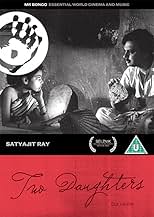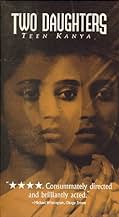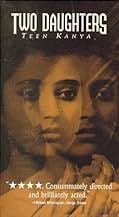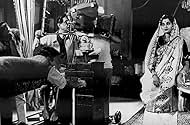Ajouter une intrigue dans votre langueBased on popular Indian stories of the great writer Rabindranath Tagore, these short films reveal definitive moments in the lives of three young girls.Based on popular Indian stories of the great writer Rabindranath Tagore, these short films reveal definitive moments in the lives of three young girls.Based on popular Indian stories of the great writer Rabindranath Tagore, these short films reveal definitive moments in the lives of three young girls.
- Réalisation
- Scénario
- Casting principal
- Récompenses
- 4 victoires au total
- Nandal (segment "Postmaster")
- (as Anil Chattopadhyay)
- Ratan (segment "Postmaster")
- (as Chandana Bandyopadhyay)
- Mrinmoyee (segment "Samapti")
- (as Aparna Das Gupta)
- Jogmaya (segment "Samapti")
- (as Sita Mukhopadhyay)
- Bishey (segment "Postmaster")
- (as Nripati Chattopadhyay)
- Phanibhushan Saha (segment "Monihara")
- (as Kali Bannerji)
- Schoolmaster and narrator (segment "Monihara")
- (as Gobinda Chakrabarti)
- Amulya (segment "Samapti")
- (as Soumitra Chattopadhyay)
Avis à la une
The Postman is the better of the two stories. Not giving away the plot, this movie had one of the most heart-wrenching scenes in cinema. The simple, but powerful way Ray pulls his quiet films together at their end makes these quiet films very memorable. Sampati drags out somewhat longer, but has a powerful climax of its own. After years, these two movies have stuck in my memory. I would recommend them to anyone.
Second entry about an upper middle class woman's marital problems is so dull I wish it were half the length of the first.
Third entry is the best, by far. A triangle between a too controlling mother, her spoiled son, and the "headstrong, crazy" girl (read a woman with a mind of her own) with whom the son is infatuated, the story is well told by Ray with a beguiling combination of comedy and tragedy. And the ending, where both the son and the girl learn to grow up, in their various ways, if they wish to salvage their marriage, is most satisfying.
First film: B Second Film: C Third Film: A
Ergo, let's give it a B.
The Postmaster has a young man coming to a small village from Calcutta to take the job of a postmaster, and there befriending his servant, an orphan girl. In addition to all her chores she helps him deal with a local madman, as well as nurses him back to health when he contracts malaria. Meanwhile, he begins teaching her how to read and write Bengali. It's a story about the pain of separating from someone you've been touched by, echoed in the lyrics of the traditional music some of the old men play one night. Ray gives us a very nice scene when the young girl comes to the postmaster at night during his sickness, and he doesn't recognize her; the way it's shot, she almost seems otherworldly. It's the feeling of this one that delivers the biggest impact though, so touching, and so true to how things often go in life.
Monihara (Lost Jewels) is about a wife who covets jewelry above all else, and continually gets her husband to buy her a piece here or there. When his business suffers from a fire, she worries that he will need to take some of it back, and flees with the help of a cousin. The framing to the story has an author talking to a robed man who faces away from him and speaks as if he's disembodied, setting a ghostly tone, and throughout the film we get the feeling that there is something supernatural going on. For example, when the man approaches his wife from behind as she stares out the window of the mansion they've inherited, Ray moves the camera slowly to the sound of eerie music, a fantastic scene. I absolutely loved the soundtrack which Ray also scored. It's spooky and foreboding, and reflects the sickness of greed and this couple's broken relationship perfectly.
The wife (Kanika Majumdar) gets a chance to sing of longing and melancholy; she's a beautiful woman with a wonderful voice, and it's too bad her character is such a shallow person. We get the idea from the author that if her husband was more forceful, she would love and respect him more. "He didn't realize that in matters of the heart, it's brute force, not meek reticence which really works. A woman prefers the harsher things, like sour green mango and hot chilies," he tells us. While that's pretty direct, I liked how the narrative didn't explicitly inform us exactly what happens to her after she leaves, allowing the viewer to fill in the blanks. It's just a lovely, haunting little story.
The last story, Samapti (The Conclusion) has a young man returning home after his exams, only to have his mother begin pushing him to get married. She arranges things with the daughter of friends of the family, but the trouble is, he doesn't feel anything for her. Instead, he finds himself drawn to a young girl who runs around the village and gets up to various mischief, an independent free spirit who is so counter to the social convention that she's referred to as "Crazy Girl." Against his mother's wishes (and the girl's too) he arranges to marry her, not realizing that the thing that draws him to her is the very thing that will make having her settle down into the role of a wife so difficult. It's like putting a bird in a cage. I love the defiance of the girl (Aparna Sen) and the tension with her husband (Soumitra Chatterjee), though this one did seem to lag a bit, and the ending seemed a bit too cheery, perhaps to compensate for the other stories.
Overall, a good collection, and worth seeing.
Without any superior technology, the acting and the depiction of the actors and actresses, and the director, respectively, have made it very real. I am giving it a seven because of my own taste. This piece is from the olden days, and for that reason, the fluidity is missing. But, I have that much sense to call it a MASTERPIECE.
Le saviez-vous
- AnecdotesThe "Monihara" segment of the film was dropped for the first international release because subtitles could not be finished in time due to budgeting constraints.
- Citations
Ratan (segment "Postmaster"): I can sing too.
Nandal (segment "Postmaster"): Is that so?
Ratan (segment "Postmaster"): I can sing now if you like.
[singing]
Ratan (segment "Postmaster"): In the lonely forest, A little girl is crying, Calling for you, Tears drop from her eyes, In the lonely forest, A little girl is crying, Calling for you, Tears drop from her eyes, With a trembling voice, She keeps calling out, With a trembling voice, She keeps calling out, The girl is lost in the forest, And nobody hears her, Nobody answers her
- Versions alternativesOriginal Indian version includes three episodes and runs 171 minutes; the version released in the USA (retitled "The Two Daughters") features only two episodes and is 114 minutes long.
- ConnexionsFeatures Conversation with James Ivory (2010)
Meilleurs choix
- How long is Three Daughters?Alimenté par Alexa
Détails
- Date de sortie
- Pays d’origine
- Langue
- Aussi connu sous le nom de
- Le directeur de la poste
- Société de production
- Voir plus de crédits d'entreprise sur IMDbPro
Box-office
- Montant brut aux États-Unis et au Canada
- 81 200 $US
- Durée
- 2h 53min(173 min)
- Couleur
- Mixage
- Rapport de forme
- 1.33 : 1





















